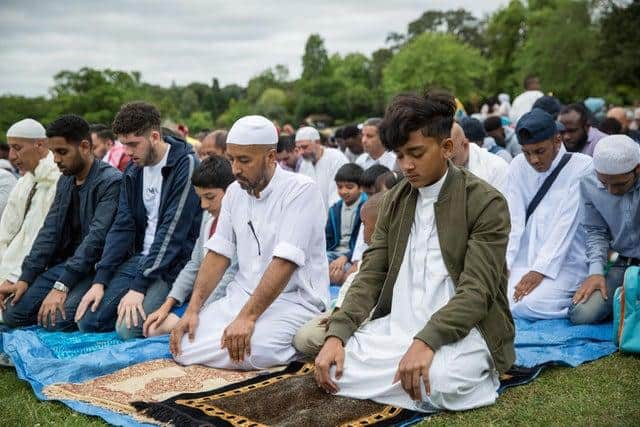What is Ramadan and when does it start 2021? Holy month explained as Muslims begin fasting under lockdown for second year
and live on Freeview channel 276
This means, all adult Muslims obligated to fast will not only abstain from drinking and eating from sunrise to sunset but also refrain from smoking, sexual relations or any sinful behaviour.
Ramadan then ends with the celebration of Eid al-Fitr or the "Festival of Breaking the Fast", which is due to take place on May 13.
What do 'Ramadan Mubarak' and 'Ramadan Kareem' mean?


Advertisement
Hide AdAdvertisement
Hide Ad'Ramadan Mubarak' translates from the Arabic word meaning 'blessed Ramadan'. It can often be used to wish someone a happy Ramadan.
'Ramadan Kareem' is also another popular greeting which means 'a blessed and generous Ramadan to you.'
What is Ramadan?
Ramadan is the ninth month of the Islamic calendar, which is also the month the Quran was revealed to the Islamic prophet Muhammad. It is marked by a month-long fast.
Muslims are required to spend a period of 30-odd days abstaining from consuming any food and drink during daylight hours as a means of celebrating and reflecting on their faith.
Advertisement
Hide AdAdvertisement
Hide AdIt is also an act of worship and a chance to get closer to God and a way to become more compassionate to those in need. Fasting is also considered a way to learn patience and break bad habits.
Muslims also believe every good deed is given manifold reward so Muslims are encouraged to do as many good deeds as they can.
Fasting is one of the five pillars of Islam - the fundamental rules that all Muslims follow - along with the Shahadah (declaration of faith) Salat (prayer), Zakat (charity) and the Hajj pilgrimage.
Those observing are encouraged to read the Quran and perform Tarawih, which are special nightly prayers that are held throughout the month.
The Islamic calendar
Advertisement
Hide AdAdvertisement
Hide AdRamadan is the ninth month of the Islamic calendar and lasts between 29 and 30 days, based on the lunar calendar.
Muslims holidays shift slightly every year due to their observance of the lunar calendar - which differs in length to the Gregorian calendar that is used worldwide - meaning celebrations fall around 11 days earlier each year.
The timing of holidays and celebrations depends on the sighting of the moon’s crescent, following a new moon.
The exact date of celebrations in the Muslim calendar can not always be predicted with certainty since the visibility of the moon is dependant on a number of factors including clear skies.
Who takes part in fasting?
Advertisement
Hide AdAdvertisement
Hide AdAll Muslims who have reached puberty are expected to fast during Ramadan, although there are some exceptions, including women who are menstruating, pregnant or breastfeeding, and those suffering from illness.
The fast begins just before dawn, when a light meal called ‘suhoor’ is permitted to be consumed. At sunset during Maghrib, it signifies the end of the fast when worshippers traditionally eat dates to break their fast.
This is called Iftar, the evening meal to end their daily fast.
What happens after Ramadan?
Muslims observe Eid al-Fitr as Ramadan comes to an end, which is often celebrated with lights, decorations and gifts.
Advertisement
Hide AdAdvertisement
Hide AdThis year, Eid al-Fitr will begin on the evening of Wednesday, 12 May and end on the evening of Thursday, 13 May.